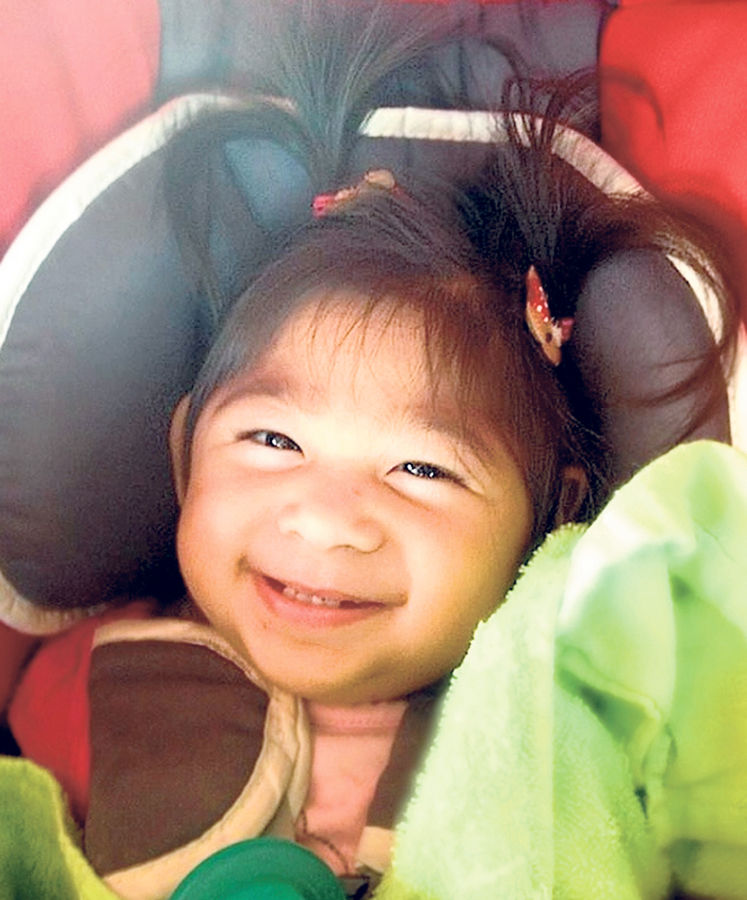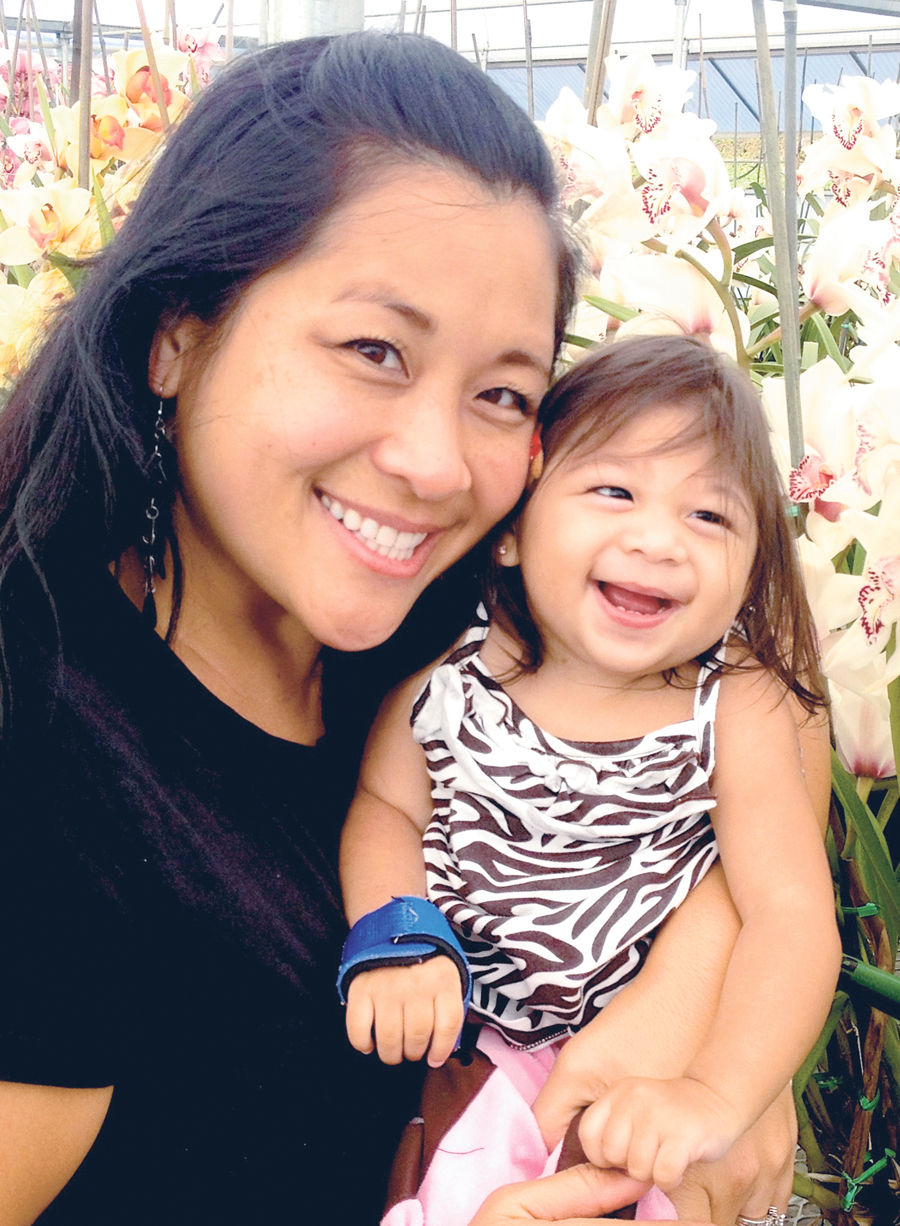Three days after their daughter Xinara Leinani Harumi was born, first-time parents John John and Liana Genovese were told that their baby girl had only 30 percent of her right brain and 10 percent of her left brain, a result of her experiencing something similar to a stroke while she was in the womb.
Liana and John John, who was given his double-moniker as a child to distinguish him from his father, John Jr. and his grandfather, John Sr., were told by doctors that Xinara would likely die by the time she was three or four months old, and that she would remain in a vegetative state until she died.
“We were sitting in the hospital thinking, ‘What are we going to do?’ My mind went into ‘business mode,’” John John says. “I said, ‘Well, we’ve got to feed the baby in 15 minutes. Then we’ll figure out what we’re going to do tomorrow and we’ll do whatever needs to be done.’
“It was like this instant amount of resolve kicked in for both of us,” he says. “And that’s how it’s been every day since our baby girl was born three years ago.”
The couple has spent untold numbers of hours with Xinara (pronounced zin-ar-ah), tirelessly using techniques and exercises suggested by Easter Seals and other medical professionals to help her brain develop.
John John gives Liana the lion’s share of the credit, saying that no matter how exhausted she is after her 12 ½ hour shifts as a nurse at Wilcox Memorial Hospital, she always makes the time to work with their daughter.
Xinara has rewarded her parents’ steadfastness. At three years old, she is very much alive, and although she still cannot walk, talk or interact with people much, she has been gradually improving.
She now reaches for and plays with a toy on her car seat that for the first year and a half of her life, she ignored. She will also grab her pacifier and put it into her mouth, a behavior normally associated with a much younger child, but big progress for Xinara, who previously could not do that.
And she loves when her parents kiss her, responding with smiles.
“As she got older and things changed, we could see that she had way more cognitive ability than what they expected,” Liana says. “Seeing how she’s changing and making progress, you never know what’s possible.”
One of the biggest pleasures for Xinara’s parents happened when she was two years old: She laughed for the very first time.
“I can remember crying with Liana beside me as I heard the most beautiful sound in the world,” John John says. “After two years of taking care of her, this was beyond our imagination. The greatest part was that we knew she could feel true joy, if even for a moment.”
Around the clock
A couple with less determination might have given up hope long ago, but the Genoveses have found strength in their faith, their love for Xinara and for each other. They also focus on remaining happy, saying that it is good for their entire family and especially for their daughter.
“On the chance that she does hear or see us, Xinara deserves to have smiling faces looking at her, regardless of how much or little she can comprehend,” John John says.
Yet even with all the love in the world, caring for Xinara is an extremely taxing, around-the-clock responsibility.
The couple sleeps in shifts; one of them always needs to be awake to look after Xinara who sleeps only four hours in any 24-hour period and has some uncontrollable behaviors that cause her to injure herself if left unsupervised. She also needs to be fed via a feeding tube every few hours because she no longer is capable of eating regular baby food anymore.
To manage, Liana works nights while John John works days and most weekends with his father in their company Malama Auctions, for which Liana also helps at certain events.
“There’s nothing about this situation that’s easy. Anybody who has a kid with special needs knows that,” John John says.
“It’s hard because we’re trying to make a living, we’re sleep deprived,” Liana says. “But we’re both really trying and that really helps.”
The couple’s bond grows as they continue to care for their daughter. For example, no matter what he’s in the middle of doing, when John John answers telephone calls from Liana, he always says, “Hello, my love” or similarly affectionate greetings.
“Never losing track of the fact that I love Liana has been really important,” John John says, noting that parents of special needs children often separate or divorce, and he wants to be sure that is not his and Liana’s fate.
And having a date night every four or five months when a relative is able to watch Xinara for a few hours, is a treat – but it can lead to unintended consequences.
“The very few minutes that we were able to spend together recently we tried to use to our advantage and have what fun we could and now . . . well, let’s just say we’ve got another baby on the way, due February 1,” John John says. “We are really excited but also very overwhelmed.”
Xinara Strong
The Genovese’s new challenge is finding appropriate transportation for their growing family. With all the gear they need to travel with anytime they leave the house with Xinara – plus their soon-to-be-born new baby – the vehicles they currently have won’t do.
They plan to sell one of their vehicles, but with an anticipated $45,000 or $50,000 price tag for an appropriate replacement that includes a lift for the wheelchair that Shriners Hospitals for Children is providing, finances are tight.
The couple has turned to crowd funding, in which anyone can help support the family by making a donation online.
“It’s very awkward because we’ve never done anything like this,” John John says. “As a professional auctioneer, I go up on stage and ask people to give money. That’s what I do for a living. But this is awkward because I’m asking for our own family.”
John John has created a logo for the campaign called “Xinara Strong,” featuring an image of muscled arms flexing with the motto, “Xinara has proven stronger than doctors could have ever predicted. How strong are you?”
Since the beginning of the crowd funding campaign on giveforward.com, donors have spontaneously borrowed photos of Xinara from the Genovese’s Facebook page and posted them on their own Facebook pages, challenging their own friends to donate.
“It’s fun to see people get excited about this, and it’s a very humbling experience. It’s been good,” John John says.
Though they undoubtedly face more challenges helping Xinara continue to grow, for the Genoveses, the only option is to persevere.
“It’s exciting to see her make changes. We always keep trying,” Liana says.
“Our daughter is a wonder and is loved more than she might know,” says John John. “Xinara will have a future, regardless of what needs she has.”
Donate to the Genovese’s transportation fund on www.giveforward.com and search Xinara. Pamela Varma Brown is the publisher of “Kauai Stories,” and the forthcoming “Kauai Stories 2.”





